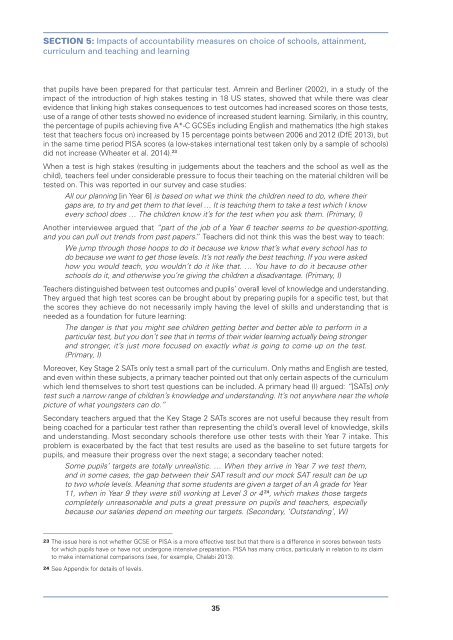exam-factories
exam-factories
exam-factories
You also want an ePaper? Increase the reach of your titles
YUMPU automatically turns print PDFs into web optimized ePapers that Google loves.
SECTION 5: Impacts of accountability measures on choice of schools, attainment,curriculum and teaching and learningthat pupils have been prepared for that particular test. Amrein and Berliner (2002), in a study of theimpact of the introduction of high stakes testing in 18 US states, showed that while there was clearevidence that linking high stakes consequences to test outcomes had increased scores on those tests,use of a range of other tests showed no evidence of increased student learning. Similarly, in this country,the percentage of pupils achieving five A*-C GCSEs including English and mathematics (the high stakestest that teachers focus on) increased by 15 percentage points between 2006 and 2012 (DfE 2013), butin the same time period PISA scores (a low-stakes international test taken only by a sample of schools)did not increase (Wheater et al. 2014). 23When a test is high stakes (resulting in judgements about the teachers and the school as well as thechild), teachers feel under considerable pressure to focus their teaching on the material children will betested on. This was reported in our survey and case studies:All our planning [in Year 6] is based on what we think the children need to do, where theirgaps are, to try and get them to that level … It is teaching them to take a test which I knowevery school does … The children know it’s for the test when you ask them. (Primary, I)Another interviewee argued that “part of the job of a Year 6 teacher seems to be question-spotting,and you can pull out trends from past papers.” Teachers did not think this was the best way to teach:We jump through those hoops to do it because we know that’s what every school has todo because we want to get those levels. It’s not really the best teaching. If you were askedhow you would teach, you wouldn’t do it like that. … You have to do it because otherschools do it, and otherwise you’re giving the children a disadvantage. (Primary, I)Teachers distinguished between test outcomes and pupils’ overall level of knowledge and understanding.They argued that high test scores can be brought about by preparing pupils for a specific test, but thatthe scores they achieve do not necessarily imply having the level of skills and understanding that isneeded as a foundation for future learning:The danger is that you might see children getting better and better able to perform in aparticular test, but you don’t see that in terms of their wider learning actually being strongerand stronger, it’s just more focused on exactly what is going to come up on the test.(Primary, I)Moreover, Key Stage 2 SATs only test a small part of the curriculum. Only maths and English are tested,and even within these subjects, a primary teacher pointed out that only certain aspects of the curriculumwhich lend themselves to short test questions can be included. A primary head (I) argued: “[SATs] onlytest such a narrow range of children’s knowledge and understanding. It’s not anywhere near the wholepicture of what youngsters can do.”Secondary teachers argued that the Key Stage 2 SATs scores are not useful because they result frombeing coached for a particular test rather than representing the child’s overall level of knowledge, skillsand understanding. Most secondary schools therefore use other tests with their Year 7 intake. Thisproblem is exacerbated by the fact that test results are used as the baseline to set future targets forpupils, and measure their progress over the next stage; a secondary teacher noted:Some pupils’ targets are totally unrealistic. … When they arrive in Year 7 we test them,and in some cases, the gap between their SAT result and our mock SAT result can be upto two whole levels. Meaning that some students are given a target of an A grade for Year11, when in Year 9 they were still working at Level 3 or 4 24 , which makes those targetscompletely unreasonable and puts a great pressure on pupils and teachers, especiallybecause our salaries depend on meeting our targets. (Secondary, ‘Outstanding’, W)23 The issue here is not whether GCSE or PISA is a more effective test but that there is a difference in scores between testsfor which pupils have or have not undergone intensive preparation. PISA has many critics, particularly in relation to its claimto make international comparisons (see, for <strong>exam</strong>ple, Chalabi 2013).24 See Appendix for details of levels.35


